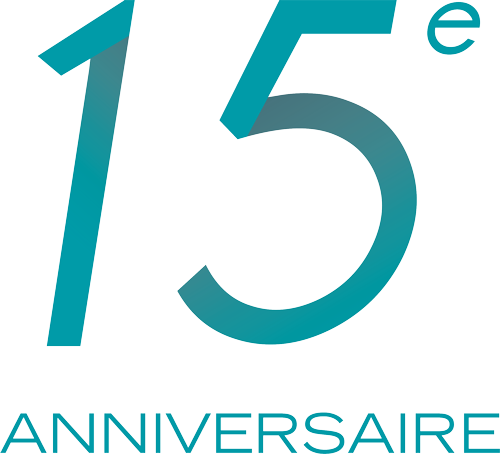Ahuntsic-Cartierville borough
Welcome to this page dedicated to Ahuntsic-Cartierville borough in Montreal. REALTA, a real estate agency, introduces you to its neighborhoods, residents, businesses, services and, of course, the quality of life offered by this highly sought-after area, both by local residents and tourists.
A haven in the north of Montreal
Situé au nord de l’île de Montréal, Ahuntsic/Cartierville est le cinquième arrondissement le plus peuplé de la ville, comptant plus de 135 000 habitants répartis dans 10 quartiers. C’est un arrondissement très prisé des résidents comme des visiteurs. Il offre un équilibre entre la vie animée de la grande ville et un environnement naturel paisible.
Among its attractions are: several locations where nature is protected and accessible to the population, proximity to other neighborhoods in Montreal and Laval, quality educational infrastructures, a diversified commercial offering, as well as a wide choice of cultural, recreational and sporting activities to suit all tastes. If you’re looking for a haven in the heart of Quebec’s metropolis, Ahuntsic-Cartierville could be just what you’re looking for. Let’s discover it!
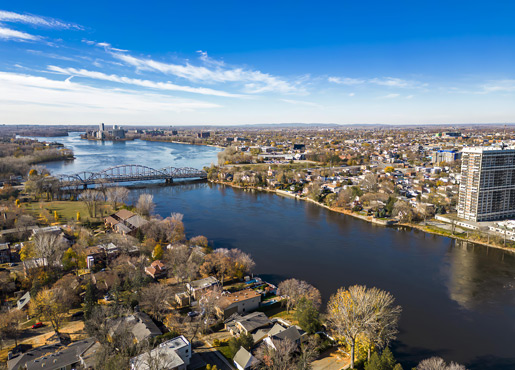
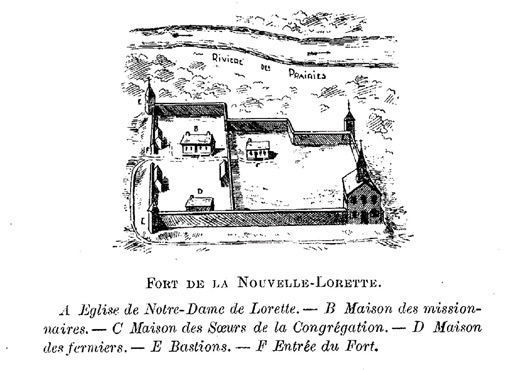
Fort-Lorette archaeological site. This is the site of a Sulpician mission that operated from 1696 to 1721. Taken from C.-P. Beaubien, Le Sault-au-Récollet: ses rapports avec les premiers temps de la colonie: mission – paroisse, Montréal, C. Beauchemin et fils, 1898, p. 238.
History
Ahuntsic-Cartierville is the result of the merger of the former towns of Ahuntsic and Cartierville, which took place in 2002 as part of Montreal’s major municipal reorganization. Ahuntsic’s history dates back to the 17th century, when the Sulpicians established a mission on the site of the future village of Sault-au-Récollet. Remnants of the past can still be seen in the Visitation church, built in 1751, and other historic buildings on the Fort-Lorette archaeological site. Over time, other villages developed along the Rivière des Prairies, including Cartierville, Gros-Sault and Back River, which became the village of Ahuntsic in 1897.
As for Cartierville, it was originally a farming village located at the confluence of the Prairies and Ottawa rivers. In the 19th century, it became a popular vacation spot for wealthy Montrealers, attracted by the region’s natural beauty. The inauguration of the railroad to Saint-Jérôme (1876) and the opening of the Millen tramway line (1892) changed all that, democratizing access to green spaces, vacationing and swimming in the Rivière des Prairies.
The municipality of Cartierville was founded in 1906 by real estate developers seeking to attract city dwellers to the countryside. The village is named in honor of George-Étienne Cartier, a Canadian politician and one of the Fathers of Confederation. Cartierville was annexed to Montreal in 1916, after Ahuntsic in 1910.
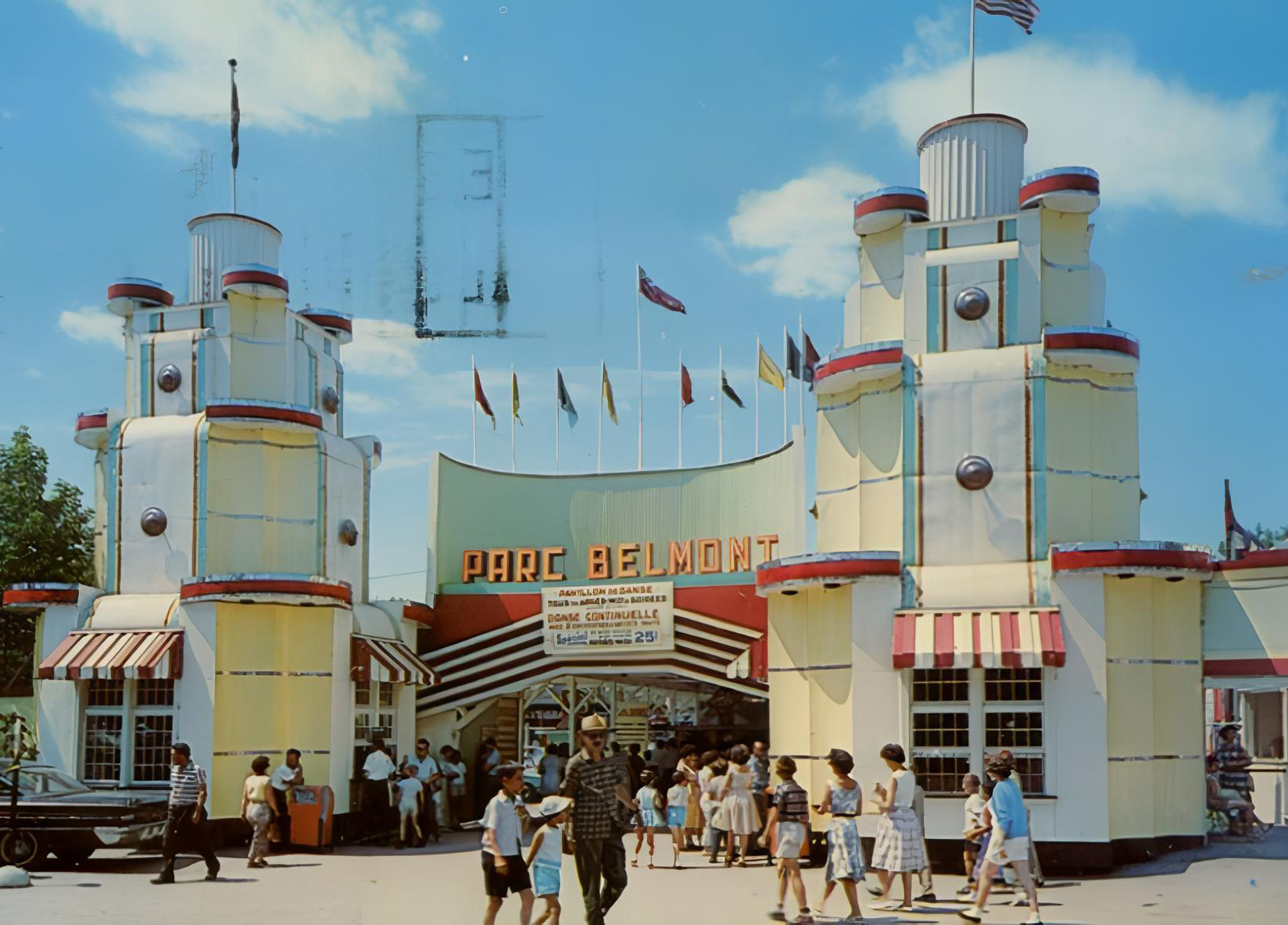
Belmont Park is still remembered by many. It opened in 1923 in Cartierville and became an amusement park in 1930. The 1967 World’s Fair and the opening of La Ronde led to its decline, and it had to cease operations in 1983. Today, it has become an ideal place to relax, enjoy nature’s attractions or practice outdoor leisure activities. Source: Library and Archives Canada (LAC) on Flickr.
Discovering Ahuntsic with Olivier Niquet and Laïma, Urbania journalist | Carnet d’adresses
Ahuntsic, a cultural and commercial destination
C’est le plus connu des deux quartiers Ahuntsic dont on dit être un endroit où il fait bon vivre. Celui-ci a su préserver son cachet patrimonial tout en se modernisant. On y trouve des rues tranquilles et des artères animées, des espaces verts et des zones industrielles. Trois institutions académiques d’importance desservent une clientèle locale et régionale: le Cégep Ahuntsic (réseau public), le Collège Mont-St-Louis (réseau privé) et le Collège André-Grasset (réseau privé). Promenade Fleury, the borough’s main commercial thoroughfare, offers well-stocked local and destination stores and boutiques, including a small shopping mall (corner of Papineau).
To discover:
- Ahuntsic Park with its shows and cultural activities, including World Weekends and Concerts Ahuntsic en fugue.
- The Parcours Gouin and Park Stanley pedestrian avenue, an urban oasis for walkers and cyclists located in Basile-Routhier park, a few steps from the Viau bridge, along the Rivière des Prairies.
Ahuntsic West, the village in the city
Ahuntsic Ouest is located west of boulevard Saint-Laurent, between boulevard Henri-Bourassa and the east-west and north-south railroad tracks. The district is concentrated around rue Fleury Ouest. The area is renowned for its dynamic commercial atmosphere, and is particularly noted for its many gastronomic destinations.
In place since 2015, the Société de développement commerciale Quartier Fleury Ouest (FLO) has some 80 members whose places of business are located between Rue St-Laurent and Rue Meilleur. The district also boasts a distinctive architectural charm. In the 1950s-1960s, the Ligue Ouvrière Catholique (Catholic Workers’ League) built red-brick semi-detached houses that have retained their distinctive character. Today, these houses have become charming family residences, and represent a particular attraction for those seeking a warm, authentic living environment.
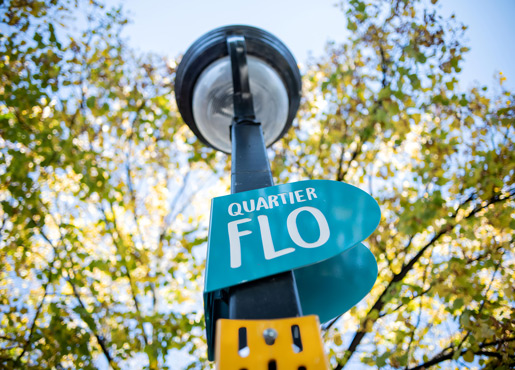
Source : Sylvie-Ann-Pare/Quartier FLO
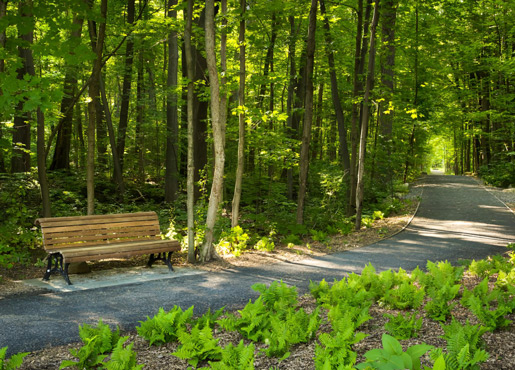
Le Parc-nature du Bois-de-Saraguay Source
Cartierville, a green and bucolic atmosphere
The neighborhood is located between Highway 15 to the east, Jean-Bourdon Street and the railroad to the south, and Rivière des Prairies to the north. The verdant, bucolic ambience attracts many families from diverse backgrounds, who find it a pleasant place to live. The district is renowned for its magnificent nature parks, including Parc de Beauséjour (for strolling and water skiing), Bois-de-Saraguay and Bois-de-Liesse, which offer nearby spaces for relaxation and outdoor recreation.
An important local institution is Hôpital du Sacré-Cœur, which provides the region with high-quality medical services. On the commercial front, there’s the section of boulevard Gouin Ouest near the Lachapelle bridge and boulevard Laurentien. The district’s main attraction is of course its waterfront, both for living and strolling.
District Central, the new world of business
The Central District is a cosmopolitan, underground, urban neighborhood covering 3 square kilometers. Once known for its textile industry (think rue Chabanel), the area is reinventing itself around three business clusters: design, urban manufacturing and technology. Today, some 1,800 companies are members of the Société de développement commercial District Central, the main architect of this metamorphosis.
It supports some 25,000 jobs, making it the 4th largest concentration of jobs in the city. Its advantage is certainly its location at the crossroads of several mass transit infrastructures, including three commuter train stations, two metro stations, soon a station for the Réseau express métropolitain (REM), and not far from highways 40 and 15.
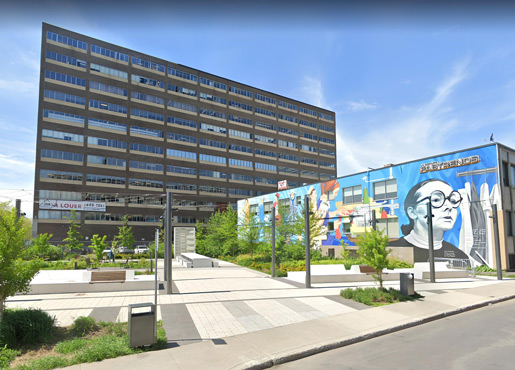
The Central District is buzzing with new artists’ studios, shops and restaurants. Arts and culture are becoming a powerful lever for economic development, making this a creative, innovative and radiant district.
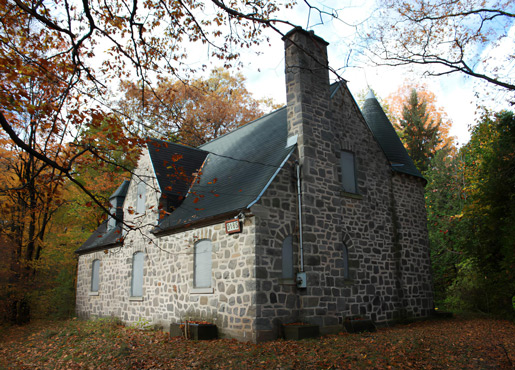
In the Domaine de Saraguay, the chauffeur’s house is characterized by its rubble stone cladding, conical-roofed turret and three large garage doors. The doors and windows were originally made of wood. Source: Répertoire du patrimoine culturel du Québec.
Domaine de Saraguay, a green and quiet area
Domaine de Saraguay is a residential area located on the banks of Rivière des Prairies, between boulevard Gouin and Highway 13. It takes its name from Domaine de Saraguay, a former estate belonging to the Lefebvre de Bellefeuille family. Classified as a heritage site since 1975, the estate is open to the public for guided tours, exhibitions and cultural events.
The Domaine de Saraguay neighborhood is distinguished by its peaceful, verdant character, with numerous single-family homes in country or contemporary styles. It also boasts a number of opulent residences. Its two nature parks, Bois-de-Saraguay and Bois-de-Liesse, offer privileged access to nature and the beautiful riverside scenery. Also worth discovering: the bicycle path that runs alongside the river.
Domaine Saint-Sulpice, a community-minded neighbourhood
Domaine Saint-Sulpice is a neighborhood bounded by rue Papineau to the east, rue Port-Royal and rue Louvain to the south, avenue Émile-Journault to the north and rue Saint-Hubert to the west. Its history dates back to the 18th century, and is characterized by a spirit of cooperation and solidarity. At the heart of the district stands the Claude-Robillard sports complex, renowned for hosting local athletes, as well as national and international competitions.
Residents benefit from the proximity of the Boisé de Saint-Sulpice, one of the first urban woodlands to be classified and protected in Quebec. It offers an unspoiled natural setting, a haven of peace in the middle of the neighborhood and the city. For their part, the presence of Ahuntsic and André-Grasset colleges adds high educational and cultural value to the local and regional community.
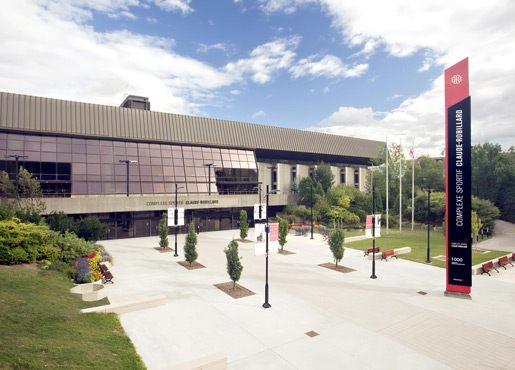
Built for the 1976 Olympic Games, the Complexe sportif Claude-Robillard is a multi-use facility. It hosts local and international competitions, while offering a wide range of programming for citizens to practice the sport of their choice. Major renovation work is underway until 2027.
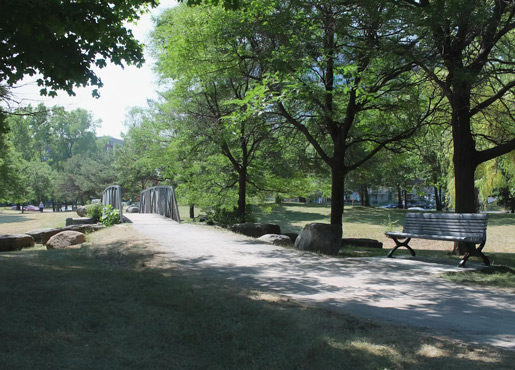
Parc récréatif Marcelin-Wilson: this is also where you’ll find the Cuisine ton quartier permanent auditory trail, offering a sonic immersion in the history and diversity of the neighborhood. Source
Nouveau-Bordeaux, a district for leisure activities
This residential neighborhood is surrounded by Ahuntsic-Ouest (to the east), Cartierville (to the west), Parc Extension and Ville Mont-Royal (to the south). It is home to Collège de Bois-de-Boulogne, an institution of higher learning, and to the Montreal detention facility, better known as the Bordeaux prison.
Boulevard de l’Acadie (to Rue Sauvé) and Rue De Salaberry (with its shopping mall) are the two main commercial arteries. Discover the Marcelin-Wilson recreational park, an ideal place to relax, enjoy nature and practice outdoor activities.
Saint-Simon, the tree-planting challenge
Saint-Simon is located between rue Chabanel Ouest to the north, boulevard Saint-Laurent to the east, boulevard Crémazie Ouest to the south, and the railroad tracks to the west. It’s a residential neighborhood that takes shape around Saint-Simon-Apôtre park, where young and old of all origins gather daily to enjoy themselves and practice their favorite sport.
Aside from this park, Saint-Simon has the reputation of being a heat island in a borough where vegetation is abundant. In fact, trees are in short supply. The borough council is working to find solutions.
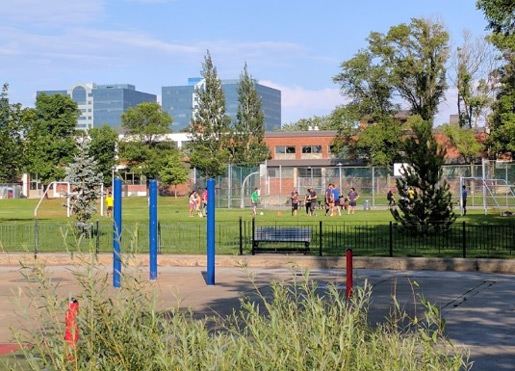
Parc Saint-Simon-Apôtre. Source : Arrondissement Ahuntsic/Cartierville
As old as Ville-Marie, Sault-au-Récollet is one of Montreal’s founding neighborhoods, born of the mighty Rivière-des-Prairies rapids. Savoir Média presents the story of a charming corner of Montreal.
Sault-au-Récollet, history and natural beauty
Bounded by Saint-Charles Street to the west and Port-Royal Street East to the south, the Sault-au-Récollet is the second most important heritage site after Old Montreal, thanks to its well-preserved historic buildings.
Among these vestiges are the Visitation church, the mill dike, and numerous rural and village homes, such as the Maison du Meunier and these lovely summer residences from the early 20th century. Take a stroll through this enchanting setting along Rivière des Prairies: Boulevard Gouin Est and Île-de-la-Visitation nature park.
Youville, a neighborhood coming back to life
Located north of Crémazie Est, the Youville district is attracting growing interest from families and young professionals. Thanks to urban improvements, it’s a dynamic neighborhood, with increasingly lively alleyways (ruelle Cha-Cha); the emergence of new convenience stores is helping to revitalize rue Lajeunesse. What’s more, the future implementation of the Berri/Lajeunesse/Saint-Denis bicycle express network will link this district to the rest of the city, offering convenient connectivity for residents.
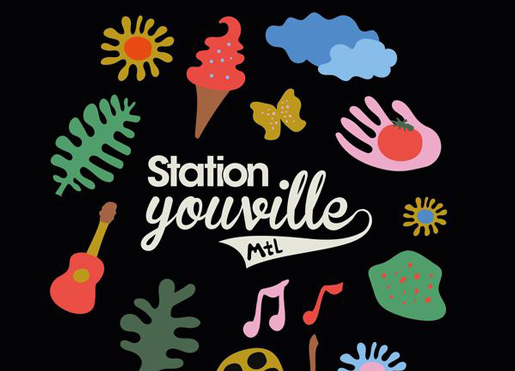
Welcome to Station Youville! An Ahuntsic citizens’ group uses a free school parking lot to liven up the neighborhood!
Ahuntsic/Cartierville in figures
- Population: 135,336, 5,639 inhabitants per km², 7.5% of the total population of the city of Montreal.
- Average age: 42 versus 38.6 for the city of Montreal.
- Surface area: 24 km².
- Person per household: 46% families with children, 2.2 persons per household.
- Renters: 61%.
- Owners : 39%.
- Average value of a family home : 772 000 $.
- Average value of a condominium : 390 000 $.
- Average monthly rent : 715 $.
- Spoken languages: 65% French, 10% English and 25% other languages.
- People with college (16%) or university (36%) diplomas in the 25 – 64 age group. Total: 52%.
- 118 green spaces
- 77 parks
- 3 parks-nature
- 16 water games and paddling pools
- 8 community gardens
- 3 libraries
- 1 house of culture
- 6 pools
- 3 arenas
- 18 outdoor rinks
- 1 refrigerated outdoor multi-sports rink
- 1 pedestrian area
- 3 subway stations
- 3 train stations
- 1 sports complex
- 4 museums
- 3 cegeps
Acadia Boulevard
The boulevard is 6.9 kilometers long, stretching from the intersection of rue Beaumont near the Acadie metro station in Parc-Extension to boulevard Gouin. Our section covers 1.4 km, between boulevard Crémazie and rue Alain-Grandbois. 110 businesses offer mainly semi-current goods (fashion and clothing accessories, home furnishings and decor, automobiles, beauty products, office supplies, gifts, gadgets, souvenirs, leisure equipment, sporting goods, etc.), restaurants of course, and the popular Marché Central (boutiques and cinema).
Chabanel Street
We’re talking about a neighborhood shopping street (District Central), located between boulevard Saint-Laurent and rue Meilleur over a stretch of 820 meters. Rue Chabanel is first and foremost a major business, employment and creative zone. The 46 ground-floor shops serve a clientele drawn from the neighborhood, workers and the customer base of non-commercial businesses. Semi-current goods, consumer services and restaurants are the main needs met.
Gouin Boulevard West
This is the short 375-meter stretch between Rue Grenet and Boulevard Laurentien. Services and personal care contribute more to the commercial dynamic than retail. The Centre Culturel De Cartierville is the main attraction on this part of boulevard Gouin.
Lajeunesse Street
Stretching 1.4 km from boulevard Crémazie to rue Sauvé, this street is home to over 85 ground-floor businesses. It’s a neighborhood commercial artery where establishments cater to the neighborhood’s basic needs. For their part, the restaurants attract residents and visitors from the surrounding neighborhoods, as well as staff from nearby professional offices. One of the pioneers of commerce on Lajeunesse Street is Marché Marcoux et frères, which has been at the helm and adding to the residential atmosphere since the 1970s.
Saint-Laurent Boulevard
This neighborhood artery brings together 48 ground-floor businesses over 925 meters. While the majority of these shops cater to the basic needs (everyday and semi-ordinary goods) of local residents, a growing proportion serve customers from beyond the borough’s boundaries, and are referred to as “destination” shops.
Fleury Street
This major artery runs 3.6 km from east to west through Ahuntsic. It is divided into three segments: rue Fleury Est, between avenue Papineau and rue J.J. Gagnier; Promenade Fleury, between rue Saint-Hubert and avenue Papineau; and Fleury Ouest, between rue Meilleur and boulevard Saint-Laurent. In all, 490 local and destination stores offer goods, professional services and gourmet destinations. Each with its own specialties and charm. Discover them all by visiting their respective websites (see Useful Links below).
Salaberry Street
Laurentian Boulevard
Many shops and service businesses are located along Laurentian Boulevard.However, the focal point is the small strip mall developed around the Marché CT. The 22 businesses listed here cater mainly to the needs of the local population, mainly for everyday goods, food and catering.
Why buy a property in Ahuntsic/Cartierville?
1) Every arrondissement, every neighborhood has its own charm. But there’s always that little something that draws us to one or the other. According to REALTA brokers, the main attraction of the Ahuntsic-Cartierville borough lies in its unique environment, which combines nature, history and quality of life. Let’s take a closer look:
- Pleasant living environment: Ahuntsic-Cartierville stands out for its pleasant, peaceful living environment, where natural spaces and urbanized areas coexist harmoniously. The predominance of greenery contributes to the quality of the neighborhoods and the satisfaction of residents. There are numerous parks, walking and cycling paths, as well as local and nearby sports facilities. What can we say about the 15 kilometers of shoreline along Rivière des Prairies, where a number of public spaces invite you to relax, enjoy outdoor activities and take part in neighborhood life? These include the magnificent Parc-nature du Bois-de-Saraguay, Parc-nature Bois-de-Liesse and Parc-nature de l’Île-de-la-Visitation.
- Lively neighborhood life: Ahuntsic-Cartierville is known as a peaceful borough, but that doesn’t mean it’s boring. It boasts a number of dynamic commercial thoroughfares with boutiques, restaurants, cafés, bars and local services. Residents have access to cultural institutions, libraries, events and activities that contribute to the cultural richness of the community. In addition, there are numerous cultural, artistic and community associations offering workshops, courses and other activities that encourage artistic expression and civic participation.
- Proximity to metropolitan Montreal: the borough is well served in terms of transportation, with three bridges (to Laval) and the A15, A19 and Route 117 highways running through it. The A40 provides east-west access to the island of Montreal. And the public transit network makes it easy to get around, with three metro stations (Henri-Bourassa, Sauvé and Crémazie), several train stations (soon to include the REM) and numerous bus routes.
- Rich historical heritage: as described above, the borough has a rich historical heritage, particularly in the Ahuntsic district. Here, you’ll find historic buildings, monuments and sites of interest that recall the borough’s history in relation to that of Montreal. Some of these sites are open to the public and offer interesting guided tours.
- Cultural diversity: the borough is one of the most densely populated in Montreal and boasts great cultural diversity. According to Statistics Canada (2016) the immigrant population in Ahuntsic/Cartierville stands at just over 41% and ranks 6th among the 19 boroughs. While there are many businesses offering products from other countries, Ahuntsic/Cartierville tries to reflect cultural diversity via its solidarity-based public markets, while favoring local products. The activities of the Maison de la culture are appreciated by the citizens who frequent it.
- A remarkable educational environment: the borough offers a wide range of educational and childcare opportunities. There are: 3 CEGEPs, two of which are public; 8 high schools, 4 of which are public; 23 elementary schools, 20 of which are public; 121 daycare centers, 68 of which are childcare centers (CPE) and 53 of which are family daycare services (SGMF).
- A milieu for gourmets: Ahuntsic-Cartierville is a gourmet borough offering a diversity of cuisines from around the world. You can sample Lebanese, Greek, Italian, Vietnamese, Indian, Moroccan and other specialties. Some examples of restaurants not to be missed are : Les Deux Copains. L’Estaminet, Sawadika Festin Thaïlandais, Cerise Café-Buvette, Le Millen, Station Pizza Moderne, Le Rendez-Vous du Thé and Zenbu Sushi.
Median price
Single-family homes
Source : Centris
Update : February 2024
Median price
Condominium
Source : Centris
Update : February 2024
In Ahuntsic-Cartierville, my real estate agency is Realta!
There are many reasons to want to live in Ahuntsic-Cartierville. Whether you’re looking to sell your property or find the perfect house or condo to buy, the opportunities are numerous.
Whether you’re buying or selling, take advantage of our real estate expertise to help you market your property successfully, or buy with peace of mind.
Meet the members of the REALTA team, Ahuntsic-Cartierville real estate broker.

Information sources and useful links
- Ahuntsic-Cartierville Borough
- Borough of Ahuntsic-Cartierville/Vie de quartier
- Borough of Ahuntsic-Cartierville – Facebook page
- Ahuntsic-Cartierville – Interactive map
- Summer in sunny Ahuntsic-Cartierville
- Ahuntsic-Cartierville Borough – Environmental booklet
- Old houses in the Ahuntsic / Cartierville district
- Fun in Ahuntsic’s wooded trails
- Parcours Gouin: a story of friendship with Rivière des Prairies
- Bordeaux-Cartierville neighborhood center
- Ahuntsic cultural center
- Promenade Fleury
- Central market
- SDC District Central
- FLO district
- Cuisine ton quartier – Ahuntsic-Cartierville
- Cartierville Cultural and Community Centre
- Ahuntsic-Cartierville Historical Society
- Souvenir sheet to mark 25 years of Hôpital du Sacré-Cœur
- Cartierville… 100 years and counting!
- Bois-de-Saraguay heritage site
- Île-de-la-Visitation Nature Park
- Ahuntsic-Cartierville Market
- The best things to do in the borough- TripAdvisor
- Ahuntsic en fugue Festival
- Station Youville -Facebook
- Summer activities on Park-Stanley Avenue
- Promenades de Jane – Take a stroll through your neighborhood!
- Parc Belmont – Groupe Facebook
- 12 bonnes adresses à Ahuntsic-Cartierville
- Les 10 quartiers les plus sécuritaires de Montréal
- Les meilleurs restos dans l’arrondissement- Resto Montréal
All real estate news
Never miss an opportunity again. Subscribe to our newsletter and be the first to know about market news, statistics and the latest properties for sale!
Contact us
"*" indicates required fields
